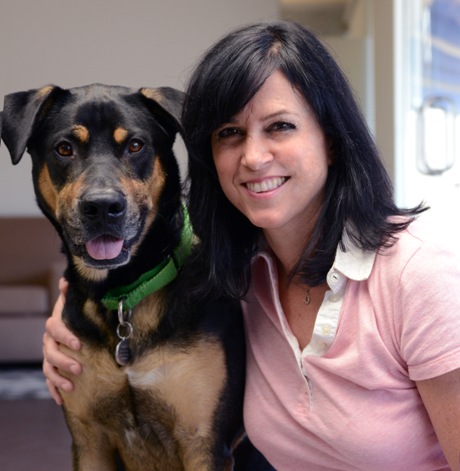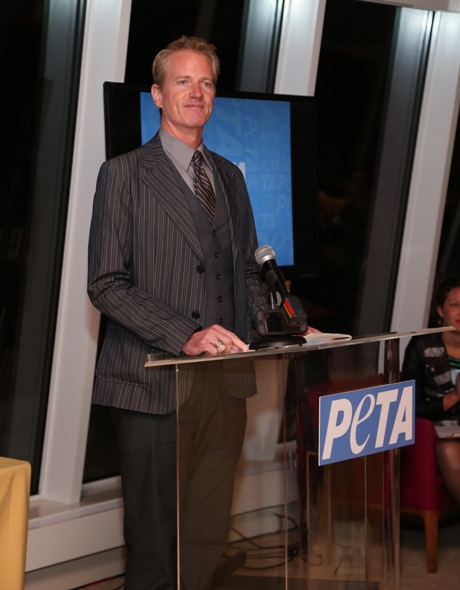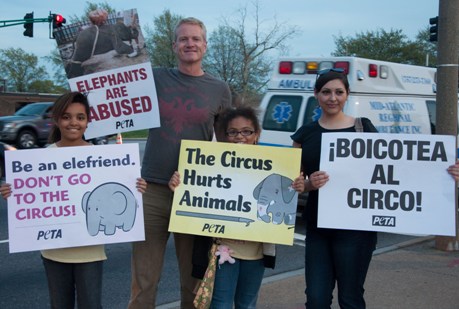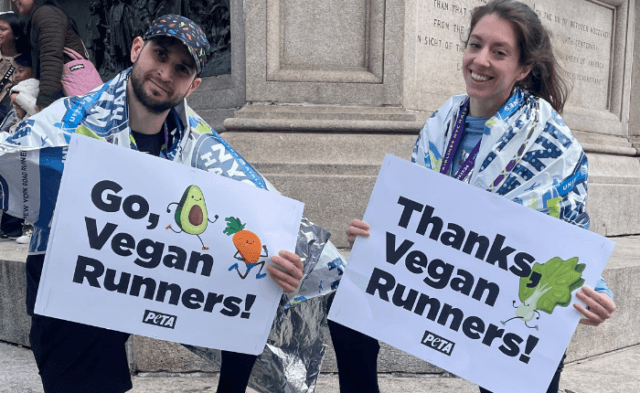Over the past 35 years, PETA has grown from two people in a spare room to the most powerful force for animal rights in the world—and it’s all because of the dedication of our members and supporters. As we toast decades of hard-hitting campaigns, headline-grabbing antics, and groundbreaking victories, longtime PETA and PETA Foundation staffers are looking back at how far we’ve come. Read about some of their favorite memories below, and then join the conversation by sharing your favorite memories and your hopes for the next 35 years on PETA’s birthday card.
Scott Anderson, Senior Vice President of Development
Since I’ve been with the PETA Foundation for more than 30 years, the changes I’ve seen are enormous. But PETA’s mission and the intensity and seriousness with which we approach our goals haven’t changed one iota.
I remember when we had no computers, no e-mail, and no cell phones. I had a landline, snail mail, and a fax machine to communicate with other staff and the very small group of members and supporters we had at that time. Our “tool kit” consisted of sending out mailings, holding public demonstrations to target animal abusers and reach the public, conducting investigations to expose animal abuse, and running after the media to get their attention.
PETA was the first animal-protection organization to conduct an undercover investigation, and our first one changed the animal rights movement forever. We exposed an experimenter in Silver Spring, Maryland, who was horribly abusing macaque monkeys in his laboratory. When we released our photographs of the cruelty that he was inflicting on the group of macaques who became known as the “Silver Spring monkeys,” the overwhelming public outcry made it one of the most substantial rallying points for animal advocates in history. People started talking about animal rights and institutionalized abuse, and it was finally about more than just cats and dogs.
Now we routinely reach millions of people in a matter of seconds through social media and online marketing. The word “vegan” has gone from an alien concept to a popular and growing trend. And I no longer hear people pronouncing “PETA” as if the first syllable were the same as what most people still call the animals they share their homes with. Everyone now knows that it’s pronounced like the flatbread!
Lisa Lange, Senior Vice President of Communications
I’ve been with PETA for 23 years, ever since Ingrid Newkirk hired me in a jail cell after we were arrested for freeing birds who were about to be used for target practice. I’ll say one thing: I really, really love how the fire and the passion and the focus of everyone at PETA are as strong as ever. We’ve never lost sight of our goals. We don’t compromise on our mission statement that “[a]nimals are not ours to eat, wear, experiment on, use for entertainment, or abuse in any other way.” The rhetoric about “bigger tanks,” “humane meat,” “any home is good enough for companion animals”? No. And we’re winning. People told us, “Slow down—the vegan thing is just too much,” “Why are you talking about fish?” and so on. But we stuck with it, and now the world is different. Everyone is going vegan. People commonly choose vegan leather, faux fur, and synthetic down. Women have said that the number one thing they look for in cosmetics is that they aren’t tested on animals. People get what we’re saying, and they’re changing the culture.
We’re taken seriously now. I remember back before that was the case. Many years ago, I was appearing on The O’Reilly Factor for the first time, shortly after the show came on the air. The host and the guests were actually screaming at me—one even compared me to Osama bin Laden in a bizarre rant. It was tough, but now, years later, Bill O’Reilly himself takes our side sometimes. People will still argue defensively with us, but they never question our information. We’ve established ourselves as the animal rights group that will get our hands dirty and do whatever it takes to find out what’s going on and show people the abuse that’s hidden from their view. And then we present solutions. Companies that used to ignore our letters now know that they can’t afford to! Often, the threat of a full-scale PETA campaign is enough to get an animal-abusing company to make the changes that we’re demanding. They view working with PETA as a good thing—mostly (wink).
Jeff Kerr, Senior Vice President and General Counsel
When PETA started, there was really no animal law to speak of. We have invented and created it from virtually nothing—and now it is one of the fastest-growing legal fields. Today, there are more than 150 schools that offer at least one animal law course, and attorneys are attending law school for the express purpose of practicing animal law for PETA. The push for animal rights is the next frontier of the social-justice movement in this country, and the legal developments already closely resemble those of the human civil rights movement. The legal department at PETA started with just one attorney in 1992, and now we have a team of 15 attorneys! Laws regarding animals are no longer seen as a means by which humans can exploit them but as meaningful protections that PETA’s attorneys push to have vigorously enforced. And we’re having a substantial impact, indeed.
We succeeded in getting the first felony convictions for cruelty to turkeys and pigs on factory farms, and we’ve established critical legal precedent upholding PETA’s right to conduct undercover investigations that expose horrific cruelty to animals in the meat, dairy, fur, leather, experimentation, and entertainment industries. We stopped a 30-year-long federal government program of secretly issuing permits to breed captive animals. And we’re pushing the envelope every day to end the enslavement of animals, including with our groundbreaking lawsuit against SeaWorld for enslaving animals under the 13th Amendment to the U.S. Constitution, the first case ever seeking to apply fundamental constitutional protections to animals.
Tracy Reiman, Executive Vice President
One of the things I like best about PETA and our work is that we’ve never let an opportunity pass us by to get the word out about animal rights, no matter what kind of zany tactics we’ve had to use to grab the attention of the media and the public. Many times, those moments in our history have been what made people and companies change.
My favorite memory is from 1995 when I was able to persuade two chicken farmers to swear out cruelty complaints against the owner of the chickens for allowing tens of thousands of birds to starve to death. This was the first time that a chicken farmer had ever been charged with cruelty to factory-farmed chickens, and he ultimately pleaded guilty and was convicted.
Now, PETA supporters are becoming so numerous and the animal rights movement so mainstream that often when someone is caught abusing animals, people around the world unleash a firestorm of outrage and our message is everywhere. When Michael Vick was arrested for fighting and killing dogs, the world changed! Even people who had never been PETA supporters started paying attention to what we were saying. When Eight Belles collapsed and was immediately euthanized during the Kentucky Derby, people’s perceptions about horse racing were altered, and they came to PETA for answers. When the frustrated orca Tilikum killed SeaWorld trainer Dawn Brancheau, people’s eyes were opened to the cruelty of captivity like never before. When the CEO of GoDaddy killed an elephant, PETA and our members jumped all over it and the Internet exploded. And we’re seeing the same phenomenon now but on an even bigger scale with Cecil the lion. The dentist who shot him, Walter Palmer, has been dubbed “the most hated man in America.”
People want to know what animal abusers are trying to hide from them. They want to know what they can do to stop it, and they want to spread the word. That’s what PETA supporters do, and it’s the reason we’ve been so successful.
Kathy Guillermo, Senior Vice President, Investigative, Legal, & Corporate Cases Media Office
I started at PETA in 1989, and my first assignments included things such as “Get a Saturday Night Live cast member to agree to pretend to vomit into a giant toilet on Fifth Avenue in New York City and proclaim, ‘What L’Oréal does to animals makes me sick!'” and “Hang a giant banner from the Eiffel Tower to protest L’Oréal’s tests on animals.” Gulp. (I did manage to get both done, and Kevin Nealon remains a loyal PETA friend to this day.) Back then, we had to chain ourselves to company doors and shout at the top of our lungs. Now, we’ve gotten the landscape for animals changed so much that we make appointments with companies, walk through those same doors, and present them with the facts. We’ve won many victories that way—but companies know we’ll still chain ourselves and shout if we have to!
One of the things that makes me proudest of PETA and our members is the huge progress that we’ve made on the animal-testing front. When I started, we had about 10 companies on our cruelty-free list—and they were all mail-order. Now we have more than 1,700 cosmetics and personal care–products companies partnering with us and pledging to be cruelty-free. As a result, you can find cruelty-free products in drugstores and department stores everywhere. As nations around the world ban animal tests for cosmetics, companies that are still conducting those tests are viewed as cruel and antiquated. This and other PETA campaigns will only continue to pick up speed. It’s been invigorating to watch, and I know that the next 35 years will be even more exciting.
Dan Mathews, Senior Vice President of Campaigns
Getting to watch the growth and change of the animal rights movement has been phenomenal. I’ll never forget when we were all crammed into a tiny rented house outside Washington, D.C., and my first job was to answer the phone and respond to the mail. We didn’t have an intercom, so I’d shout to people, run around the house, and spend all day answering questions from our members and the media one at a time over the phone. We didn’t have a computer, so I’d type up responses to people’s letters on our typewriter. Back when there were just 10 of us on staff, we all took turns making lunch for the whole office. My specialty was spicy curries. I just about killed everyone in the office—except for Ingrid, because she grew up in India!
We’ve all made a ton of friends and a ton of memories over the years. I’ll never forget when I crashed the runway at Gianfranco Ferré’s fashion show in Milan dressed as a priest. The security guards tried to tackle me, and these sweet Italian women pounced on them, beating them with programs and shouting, “Leave the priest alone!” Some of my other favorite memories are leading PETA’s first-ever naked fur demonstration in Tokyo, discussing the future of animal rights with Paul McCartney, raiding Calvin Klein’s office (and we did persuade him to go fur-free), lecturing on animal rights at Harvard University, and handcuffing myself to a shiny new car on top of a pedestal at a General Motors show and throwing “General Murderers” leaflets into the crowd. I got arrested for doing that, and Pamela Anderson, who was signing autographs at another event in the building, heard the commotion, found out PETA was involved, and tracked down security to try to bail me out. PETA got GM and every other automaker in the world to replace the use of animals in crash tests with the now-famous crash-test dummies, and Pam became one of our honorary directors.
I can’t imagine doing anything else but spending my days working alongside all the dedicated PETA supporters to keep winning victories for animals.












